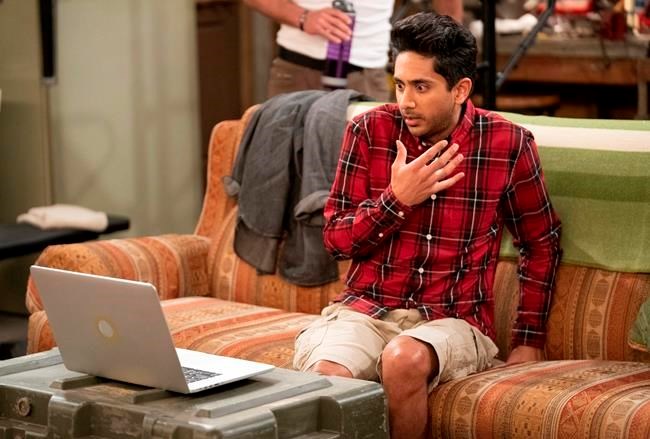LOS ANGELES — The makers of “United States of Al” are keenly aware they're treading on sensitive ground with the new CBS series about two survivors of war.
Riley is a combat veteran back from the Mideast, camped in his dad’s garage and facing post-traumatic stress disorder and a tattered marriage. He can
Now consider this: “United States of Al” is a sitcom. It arrives Thursday (8:30 p.m. EDT), embraced by advocates for Afghan and Iraqi interpreters who aided U.S. troops. It has baggage as well, dinged by observers who take exception to a South African-born actor of Indian descent who isn't Muslim playing Al.
James Miervaldis, an Army veteran who served in Afghanistan and helped bring the interpreter he worked with to America, is a booster. He heads the board of No One Left Behind, a
“We were nervous," Miervaldis said in an interview. “How was Hollywood going to capture this very serious situation, and make it funny and relatable to 99% of the country that hasn't been overseas or worn the uniform in this day and age?”
After seeing several episodes, he considers the series and its characters as “very true” to his own experience, starting with the airport reunion of Al, played by Adhir Kalyan, and Riley, the former Marine played by Parker Young. Dean Norris ("Breaking Bad") co-stars as Riley's hospitable dad.
“It brought back a lot of good emotions," Miervaldis said. "I choked up. I laughed. I wasn’t sure how else the other episodes would go, but I had the same reaction, having lived this life with my interpreter for almost five years.”
The series is under the wing of veteran producer Chuck Lorre, whose comedies have navigated weighty topics including addiction (“Mom”) and the perils of genius (“The Big Bang Theory"). He lists his first priorities for a project as laughter and characters that he and hopefully viewers will care about, Lorre said.
“United States of Al” has a lot to play with as a buddy comedy with a bonus fish-out-of-water angle. But there is also a “political element,” Lorre said. "It's inescapable, the dire circumstances of thousands of interpreters in Afghanistan who were promised safe haven.”
The show's creators, David Goetsch and Maria Ferrari, who worked with Lorre on “The Big Bang Theory” and produce the new series with him, say they approached the subject matter with respect and attention to perspective.
The writing staff includes three Afghan Americans and an Afghan-born writer, Goetsch and Ferrari said. Besides relying on No One Left Behind and other groups as resources, word-of-mouth brought them former translators willing to share their experiences.
Equal care is taken with the character of Riley, the producers said. As volunteers with a Writers Guild program for veterans for two years, they knew it could be a valuable resource; half of the six writers on a recent script had been in the guild program.
Young, whose credits include “A Million Little Things” and “Suburgatory,” said he became close friends with veterans in recent years and gained a new appreciation for the struggle some have in adjusting to civilian life, including one vet in particular.
When the “United States of Al” pilot script came to him, Young realized he'd seen "this experience play out firsthand, and it would be such an
However the series is received after its debut, early criticism came from those taking issue with a rare Middle Eastern starring role going to someone of different ancestry.
“Why not authentically cast?" actor Maysoon Zayid (“General Hospital”) said in a tweet, adding, “I crave Muslim content but this is offensive.”
The show's makers defend hiring Kalyan, whose credits include "Rules of Engagement” and “I Love Dick,” and their approach to the issue overall.
“We looked at many, many auditions of Afghan actors, and Adhir's performance is just so exceptional,” Goetsch said. “His extensive experience with the multi-cam sitcom was vital to our decision to cast him."
Al's family members, seen in early episodes in online calls from their native country, are played by Afghan or Afghan American actors, the producers said.
Kalyan, who has portrayed a variety of ethnicities and nationalities, said he sees concern over his casting as legitimate because he understands what it's like to “feel that perhaps your culture has been misrepresented.”
He's said he's striving to portray Awalmir realistically.
“I hope that when people view this, they will watch the performances and feel that the manner in which the character is being portrayed is representative in a positive way,” Kalyan said.
Lynn Elber, The Associated Press




